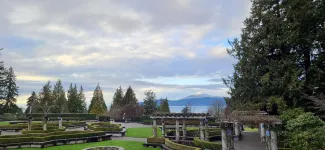I wish I had been counting the number of times Kalama Todd said the word “lands” in her 45 minute talk. The quantitative value of that number might have indicated, more than any qualitative words I might write here, the importance of land to Todd’s work and her talk, presented at Green College on February 16 and entitled ‘Confront Colonialism and Racism in the Post-Pandemic City: Lessons for Educators’.
Todd is a Métis-Cree mother, community planner, filmmaker and educator. She was the City of Vancouver’s first Indigenous Arts and Culture Planner and was also the City's Aboriginal Social Planner for several years. She is currently an adjunct professor at UBC and Simon Fraser University.
Opening the evening by presenting very short thoughts on the topic of the city, three of Green College’s Leading Scholars, Trevor Campbell, Alexandra Flynn and Lorien Nesbitt each gave their brief take on how they approached the question of building better cities from within different disciplinary mindsets. Campbell, a professor of statistics, offered his research into mapping the network connections between police shootings, a project designed to trace the potential for social contagion between officers to answer the question of whether police shootings are really a matter of simply a few bad apples or, as he concluded, a systemic problem of socialization. Flynn’s thoughts centered on how her teaching at UBC’s Peter Allard School of Law has changed over the years from focusing on how the ‘law of the books’ — that is the city charter, Canadian constitution and similar legal structures — impacts the formation of the city, to how the ‘law of the streets’ — that is how the everyday person encounters legality on the streets — impacts people’s relationship and interaction with and in the city. Finally, Nesbit, a professor of forestry offered a personal as well as academic perspective on the idea of ‘green’ cities and the problems regarding who has access to green spaces within a city, how those spaces are managed, maintained and stewarded, an issue that has become all the more evident during the pandemic as we all turn to nature within our cities.
Todd herself brought an enthusiastically personal, informed and passionate discussion for the main portion of the evening. If I could attempt to both accurately and succinctly convey here the message she brought to the virtual Coach House, it would be the question Todd often poses to her students, to others and to herself: what does it really mean to live on someone else’s land?
Who has the right to dream about the city, to build their dreams into reality, to shape the world around them into the image they see? These are questions that often go unanswered, Todd said, as we fail to reexamine how the stories of our cities are told and what those stories tell us about the land we live on.
There would be a lot to unpack from everything Todd was able to cover in her talk — and for this reason I suggest you go to Green College’s YouTube page to watch the entire talk — however there was one part that this blog writer found particularly interesting: the question of where and when does the story of a city begin.
What does it really mean that a plaque at the corner of Hastings and Hamilton memorializes the spot where L.A. Hamilton, the first land commissioner of Vancouver, drove the first stake into the ground as he began the first survey of the land that would become the city; as if this act commenced something entirely new, as though there was nothing there before Hamilton marked the ground and gave it meaning? Whose stories are told by the city, who gets to embed the story of the city into their creation as they build it?
These are questions that I look forward to mulling over at length in the future as I reflect on Todd’s words.
Green College’s Leading Scholars Series’ next event will take place on March 4 with Dr. Keri Facer giving a talk entitled ‘The Mirror and the Dancefloor: Re-Choreographing Future-Making Practices in Universities’.
by: Jane Willsie, Department of English Language and Literature, UBC; Green College Work Learn Content Writer, 2020-21
